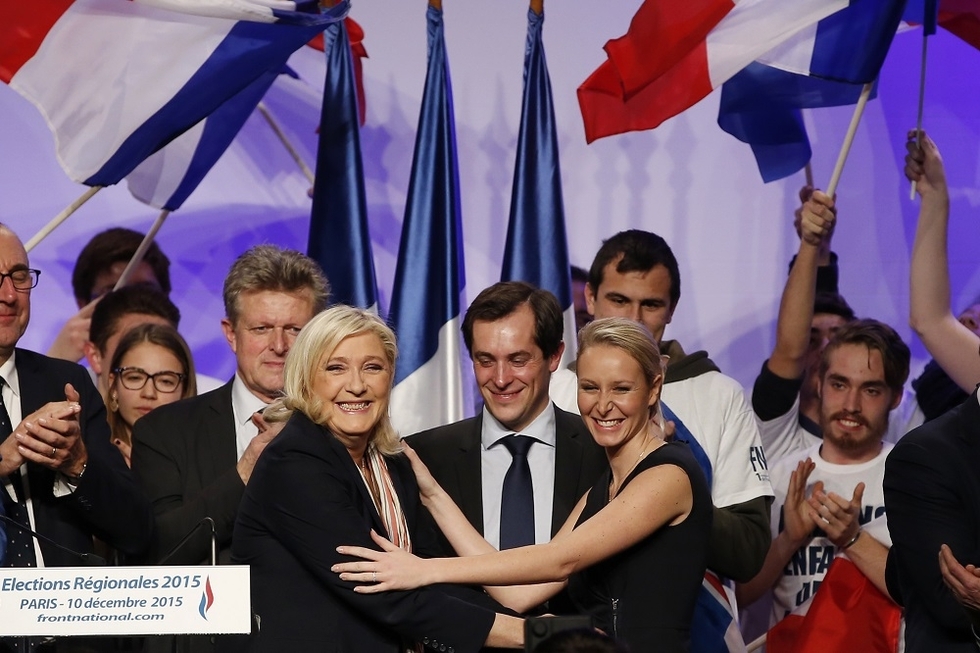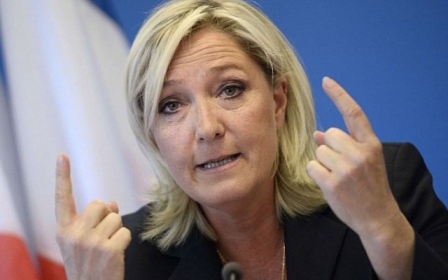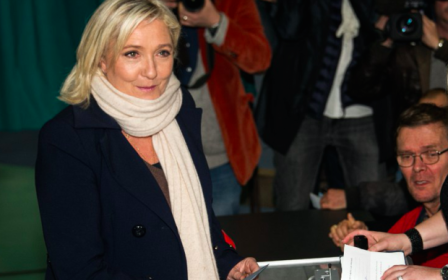ANALYSIS: The National Front is forcing France into a political make-over

As the first poll results began to came through, it became clear that the anti-Europe and anti-immigran National Front has won in six out of 13 French regions.
On TV, Socialist Party (PS) members quickly responded to those results by bringing up the same old lines about the "Republican Front," which involves merging left- and right-wings parties in order to block out the expansion of the extreme right-wing party, considered a threat to the Republic.
In front of the cameras, bearing a serious expression, Jean-Christophe Cambadelis, the Socialist Party’s leader, called on Socialist candidates who had placed third in some regions to withdraw their lists of candidates for the sake of the "Republican Front," hoping - or not, perhaps - that the other parties would also return the favor ahead of the second round of voting scheduled on Sunday.
However, apart from the social liberalz from UDI (Independent Union of Democrats) and MoDem (Democratic Movement), which welcomed the initiative, the idea of a "Republican Front" led by the Socialist Party quickly fizzled out.
The Republicans group leader, Nicolas Sarkoz,y declared that they would stick to the "no ... nor" mantra, meaning no merging with the National Front nor with the Socialist Party.
According to Thierry Solere, Hauts de Seine MP of The Republicans, the Republican Front would be "the best fuel to the National Front".
"[It looks] as if we wanted to meddle with French people votes; it might appear like a post-electoral trickery," Solere told Middle East Eye. "The regional elections are a balloting vote of proportional lists. If you get 10 percent of votes, you remain put and have representatives within the regional assembly (...) Which is crucial for opposition parties".
But Marie-Anne Kraft, MoDem national adviser and supporter of the Republican Front feels Sarkozy's "no ... nor" game is risky and could also negatively impact the 2017 presidential elections.
"That withdrawing move from the second ballot needs to be balanced. If the Socialist Party does it, the right-wing parties have to do the same," she said. "However, this is not Nicolas Sarkozy’s view point on the matter. French people should be grateful to Prime Minister Manuel Valls and to the Socialist Party for standing by it."
The analysis is shared by the Left Party (Parti de Gauche, PG). Party president Jean-Luc Melanchon has refused to give any voting instructions, telling Le Monde: "I’m not fooled, I do know that the ascension of the National Front happens to be convenient for a lot of people."
Danielle Simonnet, a member of the Paris Counsel and of the Left Party, elaborated the party's stance.
"The Socialist Party keeps ‘anti-National Front’ coating its discourses, so that in 2017 it will appear as a US-like Social Democrat party opposed to a right-wing party worn out by the National Front," Simonnet told MEE. "Then, they might have a chance to win the elections."
Even though after the first ballot the majority of the Socialist Party big names "preached the good news," it didn’t take too long for diverging opinions to burst forth. For instance, Pouria Amirshahi, a Socialist MP, told MEE that the government was responsible for the electoral defeat. "It’s a political failure (...) The socialists from the Nord Pas de Calais and PACA regions who lost the elections took a heavy toll because of something they are not responsible for," he said.
Moreover, France has entered a new political area, where it is no longer a battle between two main parties but three.
Waltz between Socialists, Republicans and the National Front?
This new rhythm was not hard to guess. Even if still occurs as a debate on semantics in the media on how to call that new "menage a trois" of the French body politic, facts are here: after more than 30 years with a two-party system characterised by a rotation between the democrat left wing and the liberal right wing, it looks like France is coming out of that bi-polar system that assured a regular alternation.
France had in the past experienced a three-party dynamic - during the 1960s with Socialists, Communists and Gaullists, or during the '70s with Centrists, Gaullists and Socialists. However, when centrist Valerie Giscard d’Estaing was elected in 1974, thanks to the alliance with the Gaullists from the Rally for the Republic Party, or when Francois Mitterrand was elected in 1981 thanks to a common campaign with the Communist Party, that set up the bi-polar rhythm as we know it, relegating the Centrists and Communists in the shadows of the right and left parties.
Nevertheless, according to demographer Herve Le Bras, who has just published a book about the National Front, with the victory of the extreme right-wing party at the regional elections, we are experiencing a serious change in the French political landscape: "We are shifting toward a three-party system which we are not really familiar with. It’s going to be problematic, for it changes the election settings, how the votes are going to be redistributed between the first and second round of each election. Basically, the democratic system works perfectly with two main parties. However, when a third one comes along, it makes things more difficult,’ he told MEE.
The institutions themselves have a binary structure. Indeed, based on the two-ballot plurality system that is the rule in France, only the two candidates who lead the first ballot are allowed to run again in the second one, which de facto benefits "big parties" and will not give a chance to smaller ones to get seats.
Now that very system, which used to reject the National Front, which was blaming it for its electoral under-representation and for always benefiting the "big parties," is going to benefit the National Front. For a long time that voting method was blocking the way to the second ballot, when the National Front used to have only 15 percent of the votes. It is now opening the way forward, when the NF at present gets 30 percent.
According to Marie-Anne Kraft, "if we do not change the voting system by 2017, we are risking seeing the National Front getting even more votes, more MPs, and more power than it would get with a system of proportional representation. This could be the beginning of something else."
As for the smaller parties, who, in the binary system, were not given an other option but being made into satellites by the big parties, they could eventually expand their influence in a three-party system. This is what the MoDem is wishing for, supporting the idea of a system of proportional representation.
The National Front: an economic threat but what about its ideology?
What strikes us most in the French political landscape and the media is the shift in the accusations against the National Front. So far, this party has been berated for its racist and anti-semitic views. However, following the first ballot of the election, regional newspaper columnists, intellectuals and politicians have been focusing on decrying its economic programme, calling it unrealistic or backward.
Here are some National Front economic ideas: leaving the euro zone, increasing corporate taxes and increasing government spending because of salary and social benefits increases.
It is an economic plan criticised by "the boss of the bosses," Pierre Gattaz, president of the Movement of the Enterprises of France), according to whom the National Front recommends "the exact opposite to help restoring economic growth in France".
For Herve Le Bras, there is no doubt to that voting for the National Front is a bet that France cannot afford right now: "The economic plan of the National Front is very dangerous for the country. Every single serious economist draws the same conclusions. It is using political slogans that sometimes contradict one another, which in a global economy can be disastrous. We cannot go back to a 1960s' economy. The National Front programme is a bad programme from the '60s. The world today has nothing to do with what it was back then, in terms of capital and goods flows.
"Bearing that in mind, people who vote the National Front are making a bad bet. The worst part is that they know it: some of them know that it can be very dangerous but for them it is the only way to see things changing. They have a slight hope that it will turn out ok, but they know it’s going to be worse," he told MEE.
That leads us to the real question here. Fighting the National Front only on its economic programme may lead public opinion to think that its extreme viewpoints - its position on minorities in society, racist hitches, accusations against Islam - are acceptable now. One of the rare voices who dared condemning the extreme ideology of the National Front was Bertrand Delanoe’s, former mayor of Paris (Socialist), who on France Inter Radio qualified the party as a "‘totalitarian party".
Nicola Sarkozy has clearly been condemning the economic plan of the National Front whilst being very tolerant about the rest. Thus he declared during a meeting, that "voting for the National Front is not unethical". He added that "the immigration issue is not a National Front gimmick but a real concern for all French people". This point of view, partly motivated by his electoral ambition, has always been his, since he said in 2011, another election year: "We cannot hold against [National Front leader] Marine Le Pen the fact that she acknowledges French people's concerns and fears. However, suggesting that France leaves the euro zone is pure madness. We need to be firm regarding that last one."
In conclusion, does only criticising the economic aspect of the National Front programme mean that the ideologies battle has been won by this very party, since the debate is no longer? Whatever the election outcome might be this Sunday, has the National Front already won the cultural and ideological battle in France?
This story originally appeared in the MEE French edition and was translated by Nassima Demiche.
New MEE newsletter: Jerusalem Dispatch
Sign up to get the latest insights and analysis on Israel-Palestine, alongside Turkey Unpacked and other MEE newsletters
Middle East Eye delivers independent and unrivalled coverage and analysis of the Middle East, North Africa and beyond. To learn more about republishing this content and the associated fees, please fill out this form. More about MEE can be found here.



